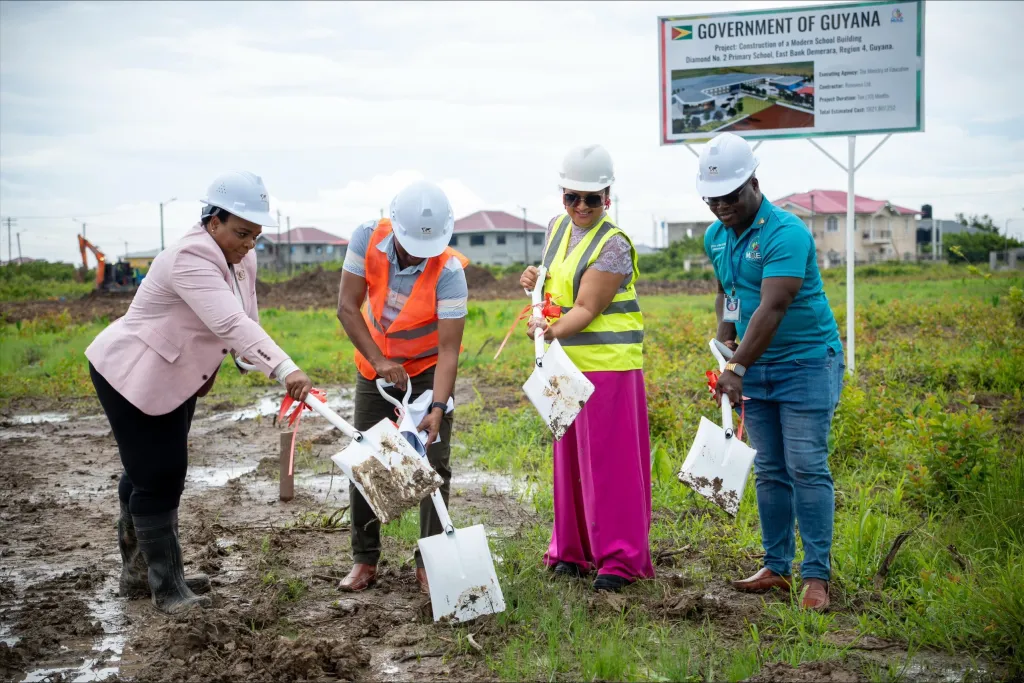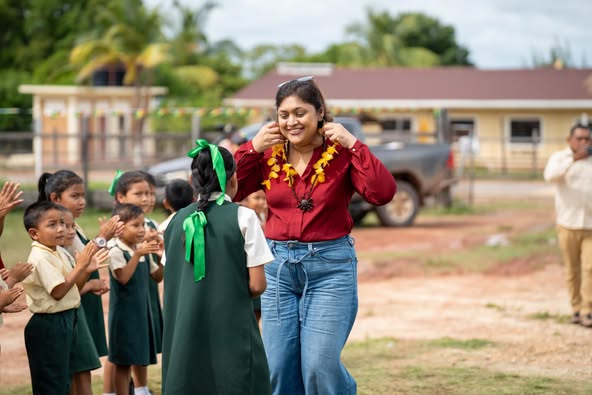…rules that Court has no jurisdiction to hear Ulita Moore’s Case
By Svetlana Marshall
OVERRULING a decision by High Court Judge Franklin Holder, the Full Court, in a unanimous decision, ruled that the Court has no jurisdiction to hear the case brought by Ulita Moore challenging the decision of the Guyana Elections Commission (GECOM) to facilitate a National Recount of all the votes cast at the March 2 Elections on the grounds that the issues raised could only be dealt with by way of an Elections Petition.
Last Friday (March 27), Justice Holder ruled that the High Court had jurisdiction to review the actions of GECOM in light of allegations that it may have acted outside of its constitutional powers when it opted to facilitate a national recount under the supervision of a high-level team from the Caribbean Community (CARICOM) based on an agreement brokered by President David Granger and Leader of the Opposition, Bharrat Jagdeo. Justice Holder’s decision was challenged by Jagdeo, and an appeal was made to the Full Court.
When the Full Court, which comprised of Chief Justice Roxane George-Wiltshire and Justice Nareshwar Harnanan, handed down its decision on Tuesday (March 31), it ruled that any challenge to decisions made by the Elections Commission could only be done by way of an Elections Petition, and not Judicial Review, as provided for in the Constitution and Electoral Laws.
As such, the order issued by Justice Holder establishing jurisdiction to hear the case of Ulita Moore v The Guyana Elections Commission, the Chairman of the Guyana Elections Commission and the Chief Elections Officer and others was vacated.
“As a further consequence, for the avoidance of doubt, the interim injunctions granted by Justice Holder would then stand discharged. It follows that the substantive Fixed Date Application would stand dismissed on the ground that the High Court had no jurisdiction to entertain it,” the Chief Justice further ruled.
Injunction
Moore had secured four interim injunctions from Justice Holder; chief among them was an interim order restraining the Elections Commission from setting aside, varying or substituting the declarations of the Returning Officers of the 10 Electoral Districts with any other document until the hearing and determination of the judicial review application. The interim injunction had also tied the hands of the Chief Elections Officer from facilitating a recount. However, with the orders being vacated and the substantive application dismissed, it is now up to GECOM to decide whether it will declare the results of the March 2 General and Regional Elections or facilitate a national recount.
COURT’S ANALYSIS
In arriving at the decision, the Full Court considered Articles 162 and 163 (1) of the Constitution, Sections 22 and 23 of the Elections Law (Amendment) Act of 2000, Section 140 of the Representation of the People Act and Section 3 of the National Assembly (Validity of Elections) Act.
The Chief Justice, in offering the Full Court’s analysis, said the evidence placed before the Court indicates that all is not well with the administration of the elections. Based on the evidence, provided through affidavits, difficulties arose during and after the declarations of the results by the Returning Officer, as well as with the applications for and refusal of applications for recounts. It was noted that approximately one month after the conduct of General and Regional Elections were held, the official results remain unknown.
“It is within this context, one would expect GECOM to step in and take charge of the situation. Article 162 (1) (b)…gives wide powers to GECOM to ensure an impartial and fair elections process. Section 22 of Act No. 15 of 2000 merely supplements or provides one of many mechanisms for ensuring that there is compliance with Article 162 in this regard,” Justice George-Wiltshire reasoned.
The Chief Justice said it is the view of the Full Court that Section 22 of the Elections Law (Amendment) Act is one of the provisions that operationalizes the powers and functions of GECOM as mandated in Article 162. Importantly, she said, Section 22 permits GECOM to address any difficulty encountered during the execution of its mandate.
Section 22 states: “If any difficulty arises in connection with the application of this Act, the Representation of the People Act or the National Registration Act or any relevant subsidiary legislation, the Commission shall, by order, make any provision, including the amendment of the said legislation, that appears to the Commission to be necessary or expedient for removing the difficulty; and any such order may modify any of the said legislation in respect of any particular matter or occasion so far as may appear to the Commission to be necessary or expedient for removing the difficulty.”
GECOM chair’s commitment
Further to that, the Full Count took into account the statement of the Chair of GECOM, Justice (Ret’d) Claudette Singh, in which it was indicated that there was an attempt to address the difficulties which arose during the electoral process. In her statement, the GECOM Chair gave an undertaking to facilitate a recount. Her decision, she said, was bolstered by the Caribbean Community (CARICOM) initiative – in which it was agreed by President David Granger and Leader of the Opposition Bharrat Jagdeo for a high-level CARICOM team to oversee a national recount of all the votes cast at the March 2 Elections.
“It was clear from this statement that this CARICOM initiative, for recount, was a mechanism for a recount over which GECOM had controlled,” the Chief Justice said.
Turning her attention to the Affidavit tendered by the Chief Elections Officer (CEO) Keith Lowenfield, Justice George-Wiltshire said the CEO, in that document, indicated that he submitted his report on the elections to the Chair of GECOM, while drawing attention to the fact that the Commission has not met to deliberate on the report.
“Be that as it may, it cannot be within the jurisdiction of the High Court to prevent GECOM from meeting to discuss the report and whatever else may be deemed to be relevant to ensure the Article 162 provision for an impartial and fair conduct of elections is carried out. Nor can the Court direct GECOM to convene a meeting for a specific purpose as claimed in the relief sought. To do so, would be to overreach or to trespass on the functions of the Commission pursuant to Article 162…” Justice George-Wiltshire made clear.
In further addressing the issue of whether the High Court has supervisory jurisdiction over the Elections Commission as sought by Moore in her application, the Chief Justice pointed to the fact that Section 140 (1) of the Representation of the People Act precludes the Court from intervening in the decision making of GECOM except by way of an Elections Petition. In support of the Full Court’s decision, she further referenced to Section 140 (2). That subsection states: “No evidence of any deliberations of the Elections Commission or communications between members of the Commission regarding its business shall be admissible in any court.” As such, she said any meeting of GECOM, as a whole, or deliberations among the Commissioners fall within the parameter of Section 140.
It was made known that the case brought by Moore differs from the case of Reeaz Holladar v the Returning Officer, Clairmont Mingo and others, in which, the High Court, on March 11, established jurisdiction to adjudicate over that matter. Justice George-Wiltshire explained that apart from the factual matrix being different, there were no provisions, such as Section 140, that applied to the statutory function of the Returning Officer. In that case brought by Holladar, the High Court found that there was substantial non-compliance with Section 84 (1) of the Representation of the People Act when Mingo tabulated the Statements of Poll for the votes cast in District 4. Additionally, she said it was not an issue that was based on the results of the elections but rather compliance with Section 84.
In his judgment, Justice Holder had found that Section 140 of the Representation of the People Act does not ouster the jurisdiction of the Court, in its ordinary jurisdiction, for Judicial Review where GECOM intends to do or alleged to have done something for which it has no jurisdiction. However, the Full Court ruled that Justice Holder erred in his analysis.
“We are of the view that Justice Holder would have erred when he failed to fully take into consideration and or apply the distinction between complete ouster clauses… and partial ouster clauses,” the Chief Justice said as she maintained the Full Court’s position that Section 140 ousters the Court’s jurisdiction to treat with the issues raised in Moore’s application at this stage. It was explained that the Section 140 (1) of the Representation of the People Act allocates jurisdiction of the High Court, however, by a special procedure – that is, by an Elections Petition, which ought to be brought within 28 days of the official declarations of the Elections results by GECOM.
“The jurisdiction of the High Court is therefore not ouster at all but Section 140 (1) merely requires the particular issue to be dealt with by a particular procedure; that is to say, by Elections Petition,” the Chief Justice further explained.
Moore in her application had contended that the Chair of GECOM and the Elections Commission, as a whole, had failed to execute their functions when they declined to declare the results of the Elections, though provided with the report by the Chief Elections Officer, and had opted for a recount. The Chief Justice iterated that the issues raised in Moore’s application are covered in Article 163 of the Constitution, and as such, could only be questioned in an Elections Petition.
“In this context, whether GECOM has performed its functions at all would speak to both acts and omissions, whether or not validly done, and would be subject to review by an Elections Petition. In this regard, any decision or functions of GECOM, in determining a result of an election would fall under Article 163 (1) (b) (i) (ii) and Rule 3, which speaks not only to an inquiry into acts of commission but also omissions,” the Chief Justice ruled.
In response to the ruling, Attorney-at-Law Mayo Robertson, one of the attorneys representing Moore, requested leave from the Court to file an appeal at the level of the Court of Appeal but that too was refused by the Full Court.
“In relation to the application for leave to appeal, the court is unanimous in refusing this application on the basis that this court, whilst acknowledging this is a serious issue by the parties, finds there is no real prospect of success of an appeal,” Justice Harnanan said as he, on behalf of the Full Court, also refused the application for a stay.
Robertson appeared in association with Grenadian Queens Counsel, Dr. Francis Alexis, and Attorneys-at-Law John Jeremie S.C., Keith Scotland out of Trinidad and Tobago, and Guyana’s Senior Counsel Roysdale Forde.
Jagdeo was represented by Trinidad’s Senior Counsel Douglas Mendes and Attorneys-at-Law Anil Nandlall and Davindra Kissoon, while the Chair of GECOM was represented by Attorney-at-Law Kim Kyte-Thomas. The Chief Elections Officer was represented by Senior Counsel Neil Boston, while Attorney-at-Law Timothy Jonas appeared on behalf of A New and United Guyana (ANUG), the Liberty and Justice Party (LJP) and The New Movement (TNM) – all added respondents in the matter.
Source: https://issuu.com/guyanachroniclee-paper/docs/guyana_chronicle_e-paper_01_04_2020



